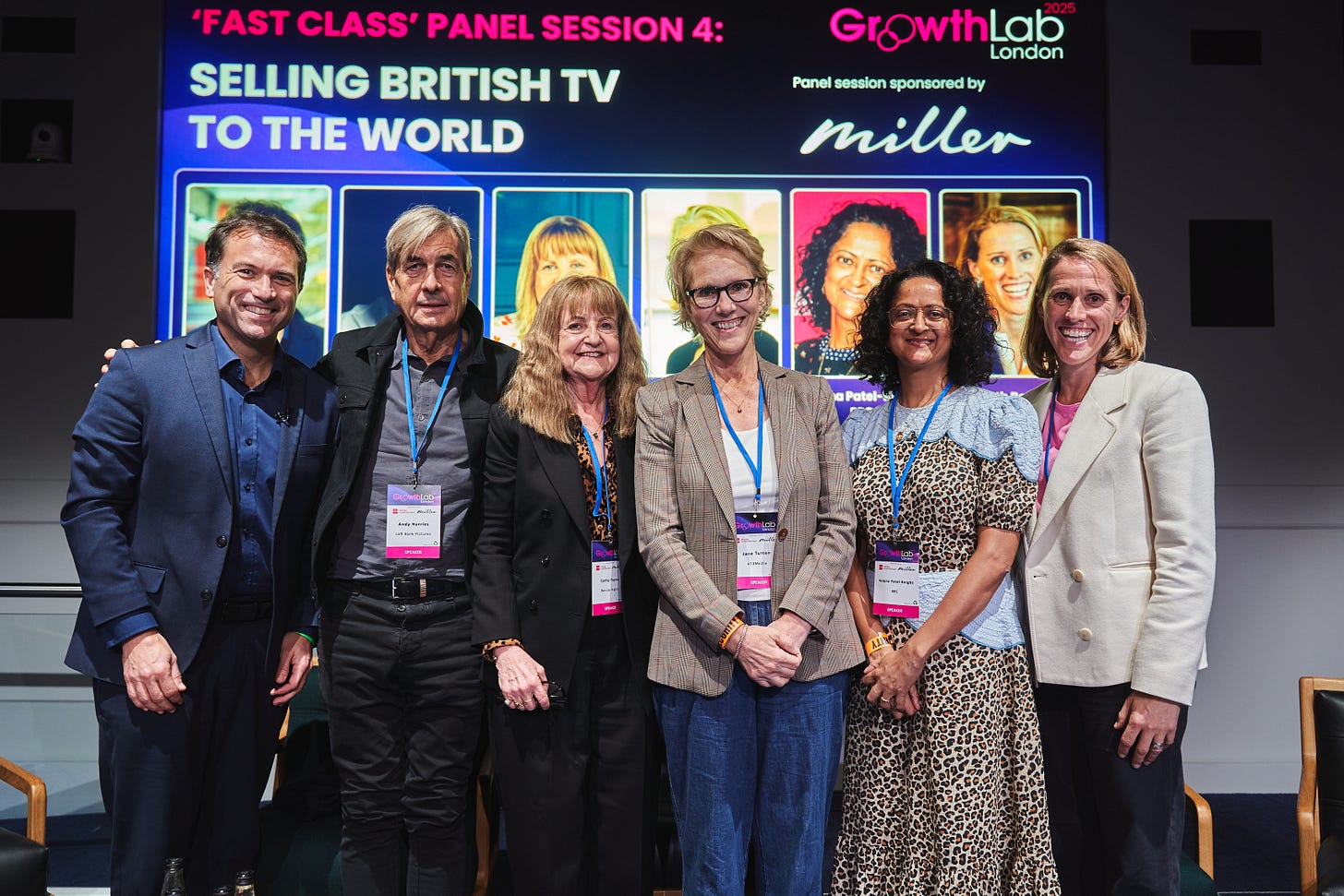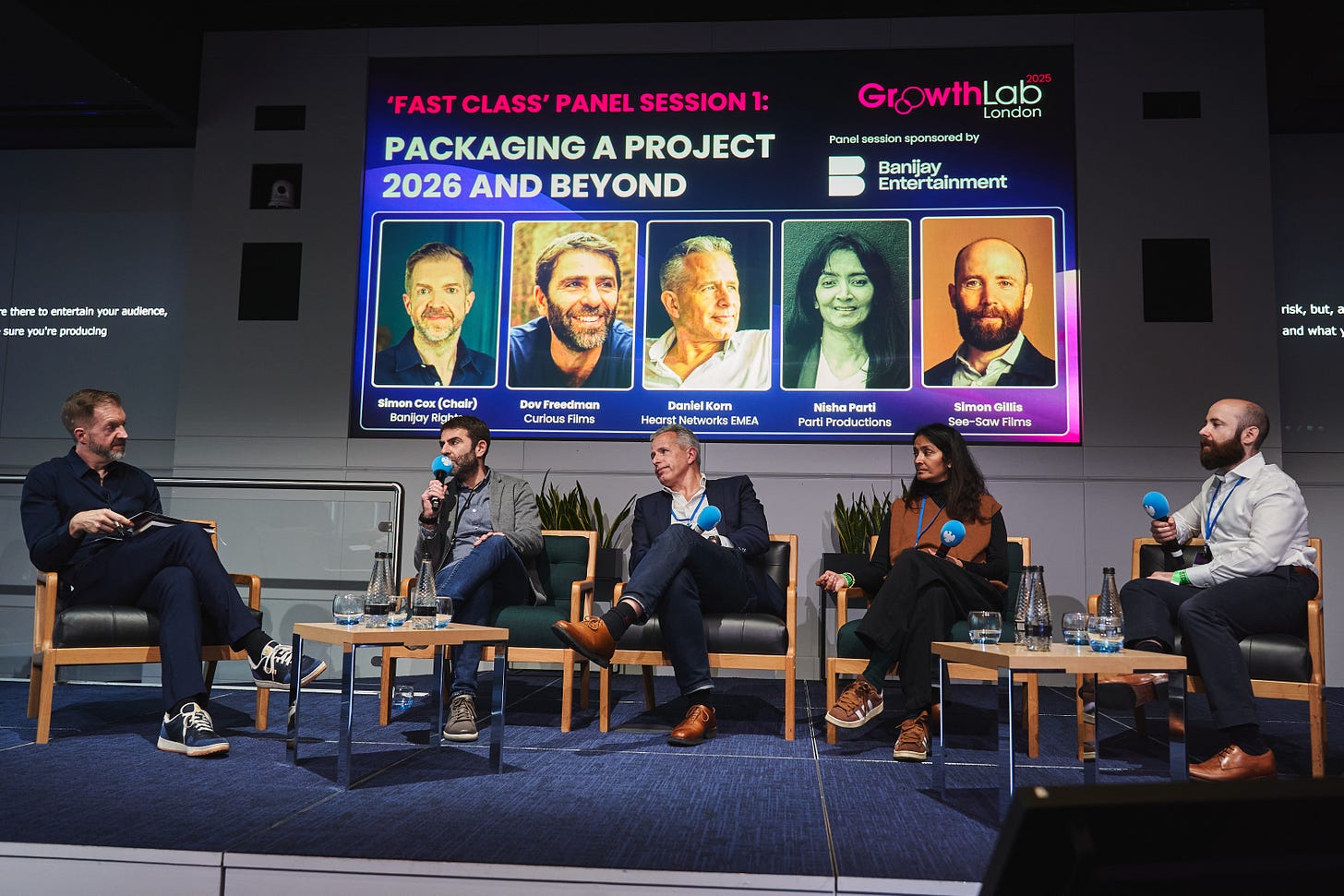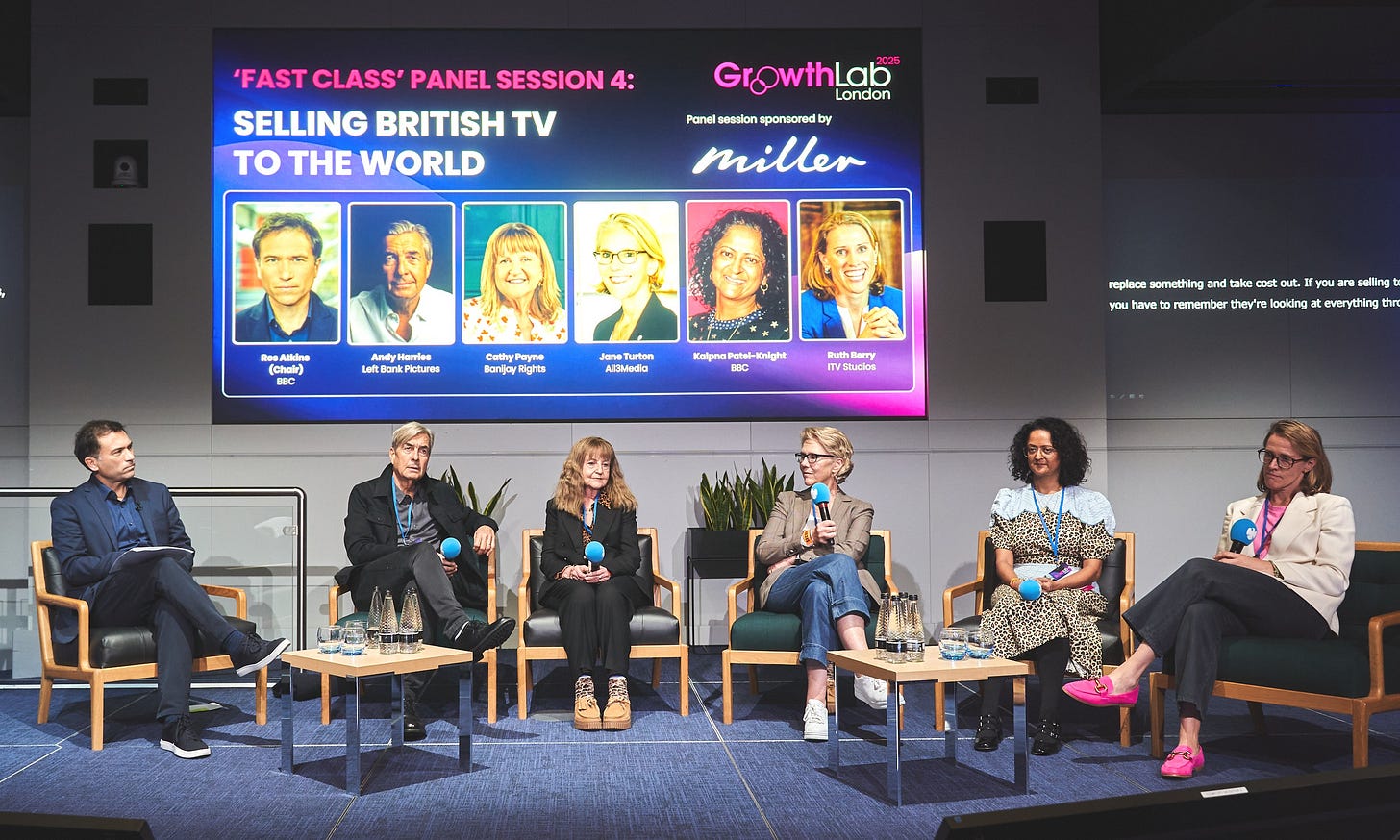GrowthLab London Special: Predictions and Opportunities in 2026
Top advice and strategies from leading industry figures who spoke at last week’s conference

Today, something a bit different: we’re bringing you highlights from two sessions at GrowthLab London.
In this newsletter you’ll hear from some of our industry’s leading thinkers about the opportunities out there.
So read on to discover:
How to sell British TV to the world, in a panel featuring Banijay’s Cathy Payne, the BBC’s Kalpna Patel-Knight, All3Media’s Jane Turton, ITV Studios’ Ruth Berry and Left Bank’s Andy Harries
Packaging a project: 2026 and beyond, with Banijay’s Simon Cox, See-Saw Films’ Simon Gillis, Curious Films’ Dov Freedman, Hearst Networks EMEA’s Daniel Korn and Parti Productions’ Nisha Parti
Analysis of the current market
Insights and predictions for the year ahead
Selling British TV to the World
In a time when the industry’s tectonic plates are shifting, BBC analysis editor Ros Atkins hosted a discussion exploring what factors are affecting sales of UK shows globally and what new trends are emerging.
Tech now vies with talent as a key part of success, said All3Media CEO Jane Turton, while BBC head of entertainment Kalpna Patel-Knight said that despite fragmentation of the market, The Celebrity Traitors proved that “appointment to view” content still works.
Banijay Rights CEO Cathy Payne pointed out that at a time when producers “haven’t had as many new orders”, monetising catalogue has proved fruitful:
“With [all] these platforms, you have to be able to discover it, and you need to be able to do that at scale and have the tech to support that.”
Left Bank Pictures founder Andy Harries said a trend worth tracking is “the growth of live sport”, while ITV Studios president, global partnerships & Zoo 55, Ruth Berry, added that “big pieces are really key” such as The Voice, “but there are also smaller shows that do a really good job”, referencing Blink Films’ Hitler’s DNA, which has been making headlines.
Patel-Knight advised that “game shows and quizzes are still selling around the world” and added that “all of our shows come with a social media strategy attached”, with user-generated content supporting formats to live beyond the main screen.
Payne also pointed out that series that can be scaled “to different markets” perform well.
Video podcasts are booming, said Turton, as they are “simple, relatively inexpensive”, though some are “quite disposable… so I think that’s probably quite an interesting question. Does it survive in a way, sitting in your library? Probably not if it’s around live sport.”
Inevitably, YouTube was discussed, and Harries noted that one of the tasks Charlotte Moore has been working on since joining Left Bank is to “develop our digital strategy and think… could we set up a small unit to work out whether we can or can’t develop original drama in some shape or form for YouTube.”
All the panellists said they were open to partnerships. Encouragingly, Harries said that although the British industry is “tough”, the market “is in a much better place” in America:
“I really feel that the market is quite good here, people are buying steadily, and in America… they’re starting to pick up UK shows again.”
When asked by Atkins what else is coming down the track, Berry said AI, and Turton pointed to “macro-economic pressure”, explaining:
“The people who aren’t being funded by the BBC are being funded typically by less and less subscription and probably more and more advertising.”
She added:
“The shift is to an ad-funded model more than ever. It’s a model we know well; three of our big commercial PSBs are ad-funded. If that starts to suffer, the only thing they can really do in the short term is cut programme spend… then we end up in this awful spiral.
I hate to say it, but what the Chancellor says in the next two weeks, whatever it is, and what happens with Donald Trump and tariffs, will have a direct effect.”
Harries also highlighted the political climate, saying we “need to be very, very aware that the future of the BBC is the future of our industry”:
“If the BBC goes down… if you follow some of the predictions about some political parties and their views on what could happen, and if you’re talking about a £40 licence fee, you can just forget British television.”

Packaging a Project: 2026 and Beyond
In a discussion focused on the evolving landscape of packaging and selling content, our panellists stressed the increased pressure on premium documentaries and the need for unique access and talent.
When asked by Banijay Rights EVP content acquisitions Simon Cox what has “changed in terms of what’s needed in a package to get a green light these days”, Curious Films CEO and founder Dov Freedman said:
“The bar’s probably become a lot higher. There’s more pressure on access and a unique way into a story, or someone that’s maybe never told that story before… that probably does put pressure on putting the package together.”
Hearst Networks EMEA vice president, programming, Daniel Korn added:
“In an on-demand environment, audiences are migrating to YouTube; they’re fragmenting. So packaging the project has never been more critical. For me, it rests on having a brilliant story to tell, something unique, a spark of originality. I think it rests also on talent, and I think it rests on access.”
See-Saw Films Joint managing director Simon Gillis agreed:
“It’s a tougher climate than ever, but there’s still a huge amount of opportunity out there and more screens for people to watch on. Yes, more fragmentation, more competition, but there’s also still a lot to play for.”
In scripted, said Parti Productions founder Nisha Parti, the key challenge is the economics:
“The biggest challenge is not that things aren’t getting commissioned, but that we’re having to make them for much less money than we were a couple of years ago… [But] if the script is good, it gets known. There is hope out there.”
Gillis added that knowing your budget level is essential:
“If you’re able to package something up and it’s branded with great IP, or it’s got A-list attachments, that can command a certain budget level.”
He used the example of Hugo Weaving, who had worked with See-Saw on Slow Horses, being attached to a legal procedural:
“That made a big difference in terms of the conversations we got to have, with people feeling safe that the show would find an international audience because of his profile.”
Korn also noted that it is “really important to understand which talent is going to appeal to the audience of that network you’re pitching to” and that while commissioners may seem risk-averse, “they’re more and more data-led… They’re looking at what people want to watch, and they’re trying to give them what they want.”
Gillis said taking risks can pay off, as Slow Horses did for Apple TV:
“Audiences are discerning and they want freshness. So I hope, despite the conservative nature of the market, that if commissioners are rewarded for taking those swings, they will take more risks.”
He added that as budgets shrink, “they’re having to become more creative… naturally opening them up to creativity, co-productions, co-commissions and novel structures.”
Freedman said Curious Films has just had a show greenlit by Channel 4 as a kind of follow-up to Shoot to Kill: Terror on the Tube, but “a much more international story”:
“We’ve been able to bring a significant distribution advance to it, as it’s an idea that would work outside the UK as well.”
Parti offered this advice:
“For me it’s all about the idea and the script.”
And Gillis concluded:
“If you’re going to spend years in a challenging environment trying to get something made, be super passionate and know what version of it you can make - even if you have a few different versions - and really have some buyers and budgets in mind from the start.



